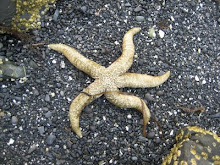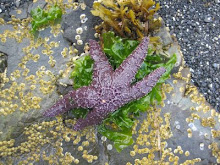I worked on Guam from 1989 to 1995 as a Dive Boat captain and a PADI Divemaster and Dive Instructor. One day we were diving Hap's Reef. (named after a long time dive guru on Guam whose name was Hap Chapman, . . . no relation)
At the end of the dive we were preparing to ascend when someone spotted an Octopus. We all watch it as it jetted around trying to get away and the amazing way they change their color. When interest waned people started to ascend up to the boat. One kid in the military continued to watch the Octopus and when no-one was watching he was able to catch the Octopus. That is when I saw what he was doing and headed over to investigate. As I approached him, he brought the Octopus up towards his mouth and as he did the Octopus enveloped his head with its long, flexible tentacles. The guy panicked as the Octopus suctioned onto his head with hundreds of its suction cups, and tried to pull the Octopus off of his head. As he did the suction of his mask and regulator were not as strong as the Octopuses and he inadvertently pulled his regulator out of his mouth and also pulled his mask off. The rush of cold water onto your face causes one to gasp and panic even more, but luckily, by that time I was close enough to come to his aid immediately. I thrust my octopus (another name for a divers spare emergency regulator) toward his mouth through the tangled mass of undulating tentacles that surrounded his head. He, of course, readily accepted the regulator and with a huge blast of exhausted bubbles from his first exhale after breathing from my emergency regulator. I started swimming him to the surface that was luckily only about 23 feet away. The blast of exhausted bubbles scared the Octopus and with one burst of its jet propulsion, away it went, back to a secluded nook in the top of the reef. I had a death grip on the regulator in his mouth with the other hand clenched onto his BC jacket. Not knowing how much water got into his mouth, I was pushing the purge button on the "reg" as we ascended at a slow, controlled rate. I felt him trying to shake me lose but my plan didn't included anything but getting to the surface before unlatching from him. A few feet from the surface I started inflated his BC and we made a smooth transition between depth and surface.
Once back on the boat I asked him how on earth the Octopus got so close to his head. Of course, still in an embarrassed state from having to be hauled to the surface by the dive guide, he started telling me about how he had learned from a Japanese fisherman in Okinawa how to kill an Octopus by biting it right between the eyes. It was everything I could do, not to call him an idiot and a moron in front of all the other divers on the boat. I did chastise him for thinking that he could kill a marine animal in front of many divers who believe strongly in the preservation of marine life. I told him that what he did out on his own was his own business but when diving as a fare paying customer on a dive boat, destroying marine life was absolutely forbidden. I also told him to think ahead in the future because if someone hadn't been there he could have easily drown.
Years later, while fishing on a long-line boat in Alaska for Halibut, a huge Octopus had taken one of the baited hooks and as we brought the Octopus to the boat , it suctioned onto the side of the boat and took us 20 minutes of strenuous tugging and prying before we were able to un-stick the Octopus. A friend in a skiff in the area came over and could get down closer to the waterline of the boat in-order to yank and tug the Octopus free. Every time he would get one tentacle free, another would stick onto the boat in its place.
Another time a friend of mine reached into a crevice on the top of Hap's Reef after an Octopus without first looking into the nook to see what else was in there. When he pulled his hand out, there was no Octopus but he had several of the long, sharp sea urchin spines sticking out off his hand. With-in an hour his hand was swollen up the size of a large grapefruit. He was in severe pain for quit a few days.
Another time MDA (Micronesian Divers Association) was doing a REEF-RELIEF clean-up dive along the coast behind INN ON THE BAY. MDA provided the boat and tanks for volunteers to clean trash out of the ocean. Two guys came to the surface with a huge piece of carpet. As they started pulling it onto the boat, hundreds of baby Octopus about an 1 to 1.5 inches long started pouring out onto the deck of the boat. I halted them and we threw the carpet back into the sea. It had already become a living environment and now belonged to the sea.
 |
| While on my mission we came upon this Japanese fisherman that was fishing for Octopus. |
 |
| He caught one and pulled it up on the dock and I remember it slithering across the pavement. It was a beautiful thing! |
 |
| During our lunch-break, I bought the line, hook assembly and bait from a near-by tackle shop and rigged it up. |
 |
| This is a photo of a medium sized Octopus that we found while doing the "Discover Scuba" program for Japanese tourists in Tumon Bay. |
 |
| This is a smaller Octopus that stuck itself to my dive booty while Beach Diving at Tumon Bay with Japanese toursits.. |
 |
| When I first looked down at my ankle I thought that I had a compound fracture! |
























